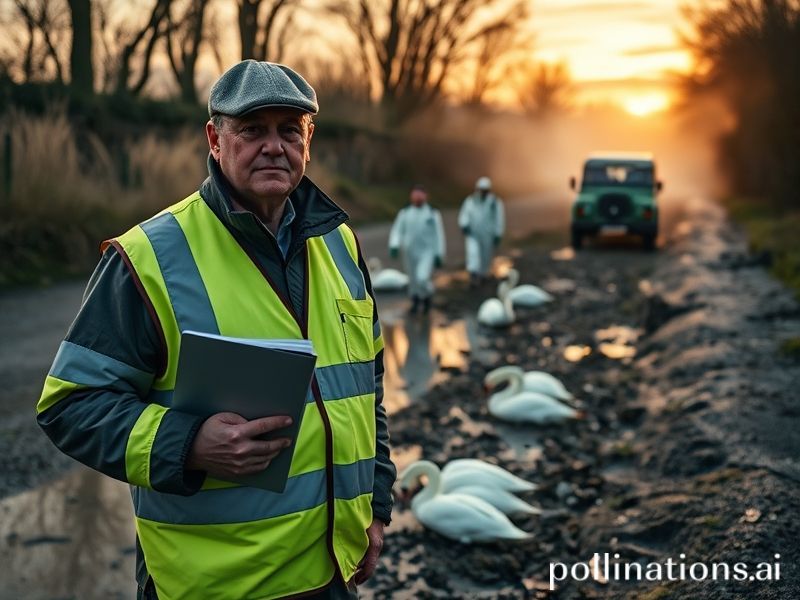DEFRA: Britain’s Polite Apocalypse Manager and Its Accidental Global Empire of Carbon Credits
DEFRA: The Department for Environment, Food & Rural Affairs, or, as the rest of the planet calls it, “the world’s most polite ecological apocalypse manager.” While most nations still pretend climate change is a future problem, the United Kingdom has gamely elevated it to a cabinet-level spectator sport, complete with white papers, select committees, and the faint smell of subsidised manure wafting in from Shropshire. Watching DEFRA operate is like watching a conscientious lifeguard trying to bail out the Titanic with a regulation teaspoon—heroic, methodical, and ultimately futile, but you have to admire the paperwork.
From the vantage point of, say, a Maldivian diplomat watching his country dissolve into the Indian Ocean, DEFRA’s latest “Environmental Improvement Plan” looks less like policy and more like performance art. Targets, pathways, “nature markets,” and the obligatory nod to “net-zero by 2050” (a date chosen, presumably, because it sounds far enough away that most current ministers will be safely retired or composted). Meanwhile, Jakarta sinks another centimetre every year, Antarctic ice shelves audition for the next Calving of the Century, and Peruvian quinoa farmers wonder why British supermarkets still fly asparagus from Lima in January. The answer, of course, is globalisation—an economic system that lets DEFRA fine a Lincolnshire farmer for letting cow slurry dribble into a brook while a container ship the length of Canterbury burns tar-grade bunker fuel just beyond Felixstowe.
DEFRA’s true genius lies in its ability to export cognitive dissonance. Brazil watches the UK lecture on Amazon deforestation while DEFRA quietly approves biomass subsidies that keep Drax Power Station incinerating North American forests. Ghana receives British aid for sustainable cocoa farming, then ships the beans to Europe on vessels whose emissions are tallied under someone else’s carbon budget. It’s a neat trick: outsource your ecological guilt, then import the artisanal chocolate with a congratulatory sticker. The French call this “diplomatie climatique”; the rest of us call it having your low-carbon cake and eating it—preferably flown in from Costa Rica under a post-Brexit trade deal.
And yet, for all the eye-rolling, DEFRA matters. When it sneezes—say, by tightening pesticide rules—Kenyan flower growers catch pneumonia. When it dithers over gene-edited wheat, Australian grain futures twitch. And when it accidentally on purpose leaks that post-Brexit farming subsidies will reward “public goods” like carbon sequestration, American agribusiness lobbyists reach for the Pepto-Bismol. In a global food system where a drought in Argentina can raise the price of tofu in Tunbridge Wells, DEFRA’s spreadsheets ripple outward like an especially bureaucratic butterfly effect.
The department’s latest wheeze is “landscape recovery,” a scheme that pays landowners to re-wild bits of England so convincingly that tourists may occasionally glimpse a beaver that hasn’t been run over. International investors—yes, Goldman Sachs is now in the peatbog business—salivate at the prospect of monetising hedgerow sequestration credits. Somewhere in the Altai Mountains, a yak herder Googles “UK peatland futures” and wonders if civilisation has finally jumped the shark. (Spoiler: it leapt long ago, but the shark is now a protected species and DEFRA is drafting guidance on sustainable chum.)
In the end, DEFRA embodies a peculiarly British form of climate governance: equal parts public-school earnestness and end-of-empire denial. It is at once a punchline and a pilot project for how rich nations will attempt to square the circle of ecological overshoot—namely, by building ever more elaborate circles. The rest of us, baking in 45-degree heat from Delhi to Dallas, can only watch and learn. Or, if we’re feeling particularly cynical, apply for a seasonal fruit-picker visa, since DEFRA’s latest labour scheme promises air-conditioned polytunnels and all the strawberries you can morally justify.
Conclusion: DEFRA may be a small island department in a medium-sized economy, but in the theatre of global environmental brinkmanship, it has landed a starring role. Its policies will not stop the permafrost from belching methane or the coral from bleaching, yet they will shape how capital, crops, and carbon flow across borders for decades. In short, DEFRA is the Mary Poppins of ecological collapse—practically perfect in every way, provided you ignore the wind changing and the fact that the umbrella is on fire.







